|
I have a good friend, Barb Kern. Barb
is a Business and Project Analyst for the CNA Insurance
Companies. She knows that I am working on a book determining what
success is and how to attain it. Although the book is still in
the research stage, Barb thought that I could gain valuable
insights about success by interviewing the most successful person
that she knows. That is how I got to meet and interview Ken
Daubenspeck. Barb was correct about Ken's insights, although
he redefines what success is for him.
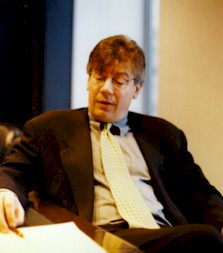 Al: Our mutual friend, Barb, thinks that
you are extremely successful. What is success, and how did you
become successful?
Al: Our mutual friend, Barb, thinks that
you are extremely successful. What is success, and how did you
become successful?
Ken: Success is a very strong label; it is not
a label that I would use for myself. I wouldn't say that I
am successful. Success for me isn't one thing; it is a
thousand little things. It is like waves. It is working right now
and then it goes away. I think that is the wonderful gift of
life-that you aren't always successful. I really mean
that. I hope that I never define myself as successful. A friend
of mine once said to me, "You don't ever want to be
done-for when you are done, you're eaten." Therefore, I think that I reject
the term success. I think that if I ever were done, I would be
dead. For me, there is a deadness about success.
Al: If success isn't a label that
you wish pinned on you, what is your philosophy of life? What is
that guides you?
Ken: My philosophy of life is aliveness.
Aliveness is when you can smell all the smells-the good and
bad smells. When you can hear things and all your other senses
are heightened, that is being alive. To me when you feel alive
that is close to how I would define success in life. It is being
in the zone or in the flow. It is total aliveness. It isn't
in making money. Lots of people can do that, but they are often
dead to being alive. Aliveness is success.
 Al: When I interviewed John Astin who
was doing a one-man play of Poe here in Chicago, I asked him
about the meaning behind the poem, Eldorado. I thought
that I knew what Poe meant, but I wanted to hear Astin express in
his words what it meant-striving for the acquisition of your
quest. However, Astin thinks that Poe meant that Eldorado is
found in the process not the destination. That's sounds like
what you are saying-not the obtaining but the pursuit.
Al: When I interviewed John Astin who
was doing a one-man play of Poe here in Chicago, I asked him
about the meaning behind the poem, Eldorado. I thought
that I knew what Poe meant, but I wanted to hear Astin express in
his words what it meant-striving for the acquisition of your
quest. However, Astin thinks that Poe meant that Eldorado is
found in the process not the destination. That's sounds like
what you are saying-not the obtaining but the pursuit.
Ken. I agree. I think that Poe is right.
Success comes in fighting the good fight-not necessarily
reaching the goal.
Al: Barb Kern told me that when you and
I meet for the interview, I would find a mirror image of myself
in you. I asked why? She said that you and I will never be
satisfied. Is that true?
Ken: Perhaps, she is right. But I see a psychological
difference between striving versus purpose. It is all about
commitment. Most of us, especially men, die emotionally when we
strive without purpose. The striving helps us survive, but it
doesn't help us to be alive. For example, making lots of
money can help us survive, but it certainly doesn't make us
come alive. Success doesn't have to do with the acquisition
of things. I feel sorry for those people who strive for money:
their wiring is all screwed up. Striving without a real purpose
for living doesn't really get us anywhere. There's so
much more possibility to draw from life. For me, success is
defined by ones ability to live truthfully, trusting life, and
affirming that life is there to nurture you and not to harm you.
To live with a purpose-that is living success. That provides
aliveness for me. Living with aliveness produces not things but
an inner peace. Also, when you are alive enough to notice another
person's suffering and you reach out to them in their
pain-that also is aliveness.
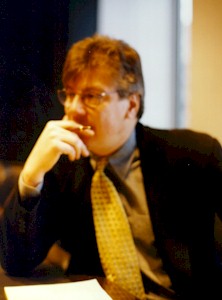 Al: How do you differentiate between a goal and striving?
Al: How do you differentiate between a goal and striving?
Ken: I think that for me goals and striving
are the same. They both come out of scarcity. Scarcity makes
people into millionaires. There is never enough money; therefore,
the scarcity drives them to make money.
However, what is the ultimate
scarcity? Time. We are all afraid of dying. I have goals, but
they are there because of my feeling of a deep-seated scarcity.
Al: What is your purpose in life?
Ken: It is playing with all of the chips at every moment.
That's what life is all about. That is more important than
obtaining all your goals. Again, that is what Astin thinks Poe
meant in Eldorado.
Al: Okay, then what is your purpose for
your children?
Ken: It is easy to want to give to your children what you
didn't have when you were growing up. Again, that desire
comes out of scarcity. My purpose for my children is to imbue
them with the ability to love and be loved. That is harder than
it sounds. For example, I want them to love themselves enough so
that they can love others. I want them to be alive. I don't
want them to be afraid of life. I want them to have courage as
they face what life brings, and I want them to be truthful.
Whether or not my children go to
college is really up to them. They will have the resources to
attend if they choose to do so. We present them a buffet of
opportunities. Although we expect them to do chores and learn a
musical instrument, my real expectation for my children is a way
of being-not a list of things they ought to do or not do.
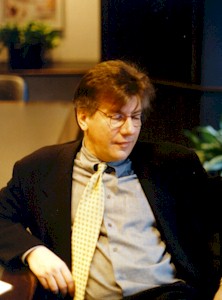 Al: Tell me about your formal education.
Al: Tell me about your formal education.
Ken: I went to DePaul and received a Bachelors
of Arts in Resources Management in 1989. I am a nonconformist and
needed to find a college that would fit me. I don't like to
be forced to comply. It has always bothered me to have someone in
a superior position make me swallow some bit of knowledge and
then regurgitate it on command. DePaul's program is
competency-based. They said to me, we want you to be competent in
fifty-six areas so that you can understand, explain them, and
create original work based upon these competencies. We don't
merely want you to repeat what the professor said in a lecture.
We want it to come out of you. So, DePaul and I set up the
fifty-six competencies, and I satisfied them fully.
Al: Barb told me that you married a
friend of hers. Tell me about your wife and family.
Ken: My wife is Rima. She is Lithuanian by lineage but born in
Argentina. Her mother left Lithuania during World War II and went
to Berlin. But when the bombing started, the family went to
Vienna, Austria until the end of the war. The family finally
immigrated to Argentina. Rima and I met at an EST seminar. She
came out of nowhere, came up to me, stretched out her hand, and
introduced herself. We started to date in October '84 and
were married June '85. Rima and I have two girls.
Al: I know from Barb that you work with
computer executives but really don't know what you actually
do.
Ken: I am an executive search consultant. I place information
technology people, executives, and management consultants. In
doing that, I help employers put together a system that does a
better job selecting, attracting, and retaining people. People
aren't fungible resources simply to be used. Rather, they
are multi-dimensional human beings. If you don't take care
of your people and recognize them as human beings, you won't
be able to keep them.
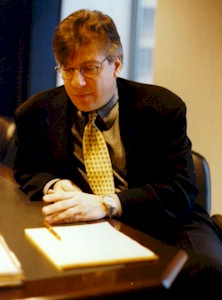 Al: After your work and life is finished, how would you want you epitaph to read?
Al: After your work and life is finished, how would you want you epitaph to read?
Ken: "Here lies a compassionate man."
Al: When Gene Siskel interviews someone,
he always asks what is that person's favorite movie. He says
that it tells much about the person that he or she might not
readily reveal. What is your favorite movie?
Ken: Same Time Next Year.
Al: Why?
Ken: It is a psychological movie rather than an action film.
It deals with a maturing relationship between two people and
their stages of growth. Another one would be On Golden
Pond. Both of them deal with honest relationships that
endure during good and bad times. You remember the book, The
Velveteen Rabbit. Both these movies deal with pushing
toward a loving relationship and becoming real
just like in The Velveteen Rabbit.
 Al: If they made a movie of your life,
who would you want to play you?
Al: If they made a movie of your life,
who would you want to play you?
Ken: Anthony Hopkins. He obtained success
early in his career-before he was ready to handle it. As a
result, he had bouts with alcoholism and gambling. However, he
was able to overcome those addictions and go on to even greater
success. He is a remarkable man.
Al: You are a many-faceted person. Do
you play a musical instrument?
Ken: No. I can't even keep a radio in tune.
Al: Well, if you can't play music, what
kind of music do you like?
Ken: I love classical music. There are times that I like to
listen to Baroque music and other times I like Wagner. I also
like balladeers. People like John Denver, Steve Winword, and
Tracy Chapman-I like thinking music.
Al: Barb said that you are also a painter.
Ken: For me, the reason that I paint is because it is very
private. I don't have to perform or produce. I know that
when I am stressed out, I can be very much in the moment and
totally present. The oil and the canvas can be time-stoppers, and
I love it. My work falls somewhere between impressionism and
expressionism.
Al: Who are the artists that you most
admire?
Ken: Monet. But the person I love the most was the man who use
to take Monet out early in the morning in that flat boat and hold
the boat still for hours while Monet waited for just the right
light. But Monet is my favorite painter. Incidentally, Monet and
I share the same birthday, October 23rd.
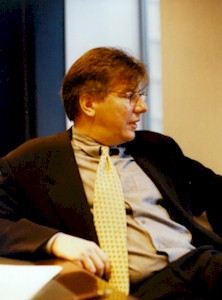 Al: How old are you?
Al: How old are you?
Ken: 45.
Al: Are you familiar with William
Turner?
Ken: No, I'm not.
Al: Sometime, check out Turner. His
later paintings start to move toward impressionism. I think that
you would like him. In the meantime, thank you for your time and
willingness to be interviewed: it was a good interview.
Don't forget to get tickets for the Renoir exhibition.
Ken: I've already gotten the tickets.
10/97
To read John Astin's interview and article, just click on both these hyperlinks:
Edgar Allan Poe-Once upon a midnight
John Astin's Riding to Eldorado
|







 Al: Our mutual friend, Barb, thinks that
you are extremely successful. What is success, and how did you
become successful?
Al: Our mutual friend, Barb, thinks that
you are extremely successful. What is success, and how did you
become successful? Al: When I interviewed John Astin who
was doing a one-man play of Poe here in Chicago, I asked him
about the meaning behind the poem, Eldorado. I thought
that I knew what Poe meant, but I wanted to hear Astin express in
his words what it meant-striving for the acquisition of your
quest. However, Astin thinks that Poe meant that Eldorado is
found in the process not the destination. That's sounds like
what you are saying-not the obtaining but the pursuit.
Al: When I interviewed John Astin who
was doing a one-man play of Poe here in Chicago, I asked him
about the meaning behind the poem, Eldorado. I thought
that I knew what Poe meant, but I wanted to hear Astin express in
his words what it meant-striving for the acquisition of your
quest. However, Astin thinks that Poe meant that Eldorado is
found in the process not the destination. That's sounds like
what you are saying-not the obtaining but the pursuit. Al: How do you differentiate between a goal and striving?
Al: How do you differentiate between a goal and striving? Al: Tell me about your formal education.
Al: Tell me about your formal education. Al: After your work and life is finished, how would you want you epitaph to read?
Al: After your work and life is finished, how would you want you epitaph to read? Al: If they made a movie of your life,
who would you want to play you?
Al: If they made a movie of your life,
who would you want to play you? Al: How old are you?
Al: How old are you?